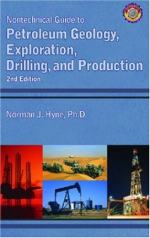|
This section contains 2,435 words (approx. 9 pages at 300 words per page) |

|
Petroleum is a term that includes a wide variety of liquid hydrocarbons. Many scientists also include natural gas in their definition of petroleum. The most familiar types of petroleum are tar, oil, and natural gas. Petroleum forms through the accumulation, burial, and transformation of organic material—such as the remains of plants and animals—by chemical reactions over long periods of time. After petroleum has been generated, it migrates upward through the earth, seeping out at the surface of the earth if it is not trapped below the surface. Petroleum accumulates when it migrates into a porous rock called a reservoir that has a non-porous seal or cap rock that prevents the oil from migrating farther. To fully understand how petroleum forms and accumulates requires considerable knowledge of geology, including sedimentary rocks, geological structures (faults and domes, for example), and forms of life that have been fossilized or...
|
This section contains 2,435 words (approx. 9 pages at 300 words per page) |

|


